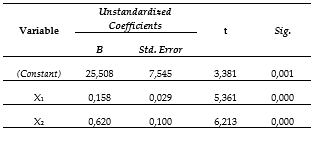Main Article Content
Abstract
This research is motivated by the high level of smartphone addiction among students. This is due to the coping activities carried out as a form of release from academic stress experienced by students. One of these coping activities is cyberloafing behavior. This study aims to determine the impact of academic stress and cyberloafing on smartphone addiction. This study is quantitative research with multiple regression analysis. The population in this study were 319 students of class XI SMA N 4 Padang, and the sample size was 177 people using the Proportional Random Sampling technique. The data was collected using an academic stress instrument. The results of the validity and reliability test of the academic stress instrument adapted from the SSA scale (Academic Stress Scale) were declared valid and reliable. Data were analysed with descriptive statistics and multiple regression. The results of this study indicate that academic stress and cyberloafing together have a significant impact on smartphone addiction. This means that the higher the level of academic stress experienced by students and the higher the cyberloafing carried out, the higher the level of smartphone addiction by students. This finding can be a reference for counselling teachers to provide services in reducing academic stress and reducing the level of cyberloafing and smartphone addiction in students.
Keywords
Article Details

This work is licensed under a Creative Commons Attribution-ShareAlike 4.0 International License.
References
- Adiba, W. Z., Kadiyono, A. L., & Hanami, Y. (2021). Motif dan Kepuasan Penggunaan Cyberloafing, Baik atau Buruk ?: Performanance, 28(2), 52–61. DOI: 10.20884/1.jp.2021.28.02.4246
- Agusta, D. (2016). Faktor-Faktor Resiko Kecanduan Menggunakan Smartphone. E-Journal Bimbingan dan Konseling, 5(3), 86–96. https://journal.student.uny.ac.id/ojs/index.php/fipbk/article/view/1021/909
- Askew, K. L. (2012). The Relationship Between Cyberloafing and Task Performance and An Examination of The Theory of Planned Behavior As a Model Of Cyberloafing [Dissertation, University of South Florida]. Digital Common University of South Florida. https://digitalcommons.usf.edu/cgi/viewcontent.cgi?article=5153&context=etd
- Asosiasi Penyelenggara Jasa Internet Indonesia. (2022). Laporan Survei Internet APJII 2011-2022 Q1. Jakarta: Asosisasi Penyelenggara Jasa Internet Indonesia. https://survei.apjii.or.id/
- Balnchard, A.L., & Henle, C. A. (2008). Correlates of Different From of Cyberloafing: The Role of Norms and External Locus of Control. Computers in Human Behavior, 24(3), 1067-1084. https://doi.org/10.1016/j.chb.2007.03.008
- Chiu, S. -I. (2014). The Relationship Between Life Stress And Smartphone Addiction On Taiwanese University Student: A Meditation Model Of Learning Self Efficacy And Social Efficacy. Computers in Human Behavior, 34, (2014) 49-57. http://dx.doi.org/10.1016/j.chb.2014.01.024
- Choliz, M. (2012). Mobile-Phone Addiction in adolescence: The test of Mobile Phone Dependence (TMD). Progress in Health Sciences, 2(1), 33-44.
- Fahmi, F. 2011. Hubungan Self Efficacy dengan Stres Akademik pada Mahasiswa [Unpublished undergraduate thesis]. Semarang: UKS.
- Govaerst, S. & Gregoire, J. (2004). Stressful Academic Situations: Study on Appraisal Variables in Adole Scence. Britsh Journal of Clinical Psychology, 54(4), 261-271. https://doi.org/10.1016/j.erap.2004.05.001
- Hamrat, N., Hidayat, D. R., & Sumantri, M. S. (2019). Dampak Stres Akademik dan Cyberloafing terhadap Kecanduan Smartphone. Jurnal EDUCATIO: Jurnal Pendidikan Indonesia, 5(1), 13. https://doi.org/10.29210/120192324
- Kariv, D., & Heiman, T. (2005). Task-oriented versus emotion-oriented coping strategies: the case of college students. College Student Journal, 39(1), 72-89. https://link.gale.com/apps/doc/A131318248/AONE?u=googlescholar&sid=bookmark-AONE&xid=6e186ea5
- Himmelsbach, T. A. (2011). Survey on Today’s Smartphone Usage. Germany: GRIN Verlag.
- Iskandar, I. (2011). Motif Mahasiswa untuk Menggunakan Ponsel Pintar di Surabaya. Surabaya: Universitas Pembangunan Nasional Veteran Surabaya.
- Karuniawan, A, & Cahyanti, I.Y. (2013). Hubungan antara Academis Stress dengan Smartphone Addiction pada Mahasiswa Pengguna Smartphone. Jurnal Psikologi Klinis dan Kesehatan Mental, 2 (1), 16-21. https://journal.unair.ac.id/download-fullpapers-jpkk260c1a8f56full.pdf
- Kwon, Y. S., & Paek, K. S. (2016). The Influence Of Smartphone Addiction On Depression And Communication Competence Among College Students. Indian Journal of Science and Technology, 9(41), 1-8. 10.17485/ijst/2016/v9i41/103844
- Leung, L. (2008). Linking Psychological Attributes To Addiction and Improper Use of the Mobile Phone Among Adolescents in Hong Kang. Journal of Children and Media, 2(2), 93-113. https://doi.org/10.1080/17482790802078565
- Lim, V. K. G., & Teo, T. S. (2005). Prevalence, Perceived Seriousness, Justification And Regulation Of Cyberloafing In Singapore: An exploratory study. Information & Management, 42(8), 1081-1093. https://doi.org/10.1016/j.im.2004.12.002
- Pratiwi, C. P., Andayani, T. R., & Karyanta, N. A. (2012). Perilaku Adiksi Game Online Ditinjau dari Efikasi Diri Akademik dan Keterampilan Sosial pada Remaja Di Surakarta [Undergraduate Thesis, Universitas Sebelas Maret].
- Rahmawati, D. D. (2012). Pengaruh Self-Efficacy Terhadap Stres Akademik Pada Siswa Kelas I Rintisan Sekolah Bertaraf Internasional (RSBI) Di SMP Negeri 1 Medan [Undergraduate Thesis, Universitas Sumatera Utara.
- Samaha, M., & Hawi, N. S. (2016). Relationships Among Smartphone Addiction, Stress, Academic Performance, and Satisfaction with Life. Computers in Human Behavior, 57, 321–325. https://doi.org/10.1016/j.chb.2015.12.045
- Smart, A. (2010). Cara Cerdas Mengatasi Anak Kecanduan Game. Yogyakarta: A Plus Books.
- Suller, J. (1999). Computer and Cyberspace Addiction. http://www.rider.edu/index.html
- Van Deursen, A. J. A. M., Bolle, C. L., Heghner, S. M. & Kommers, P. A. M. (2015). Modelling Habitual and Addictive Smartphone Behaviour The Role of Smartphone Usage Types, Emotional Intelligence, Social Stress Self Regulation, Age And Gender. Journal Computer in Human Behaviour, 45, 411- 420. https://doi.org/10.1016/j.chb.2014.12.039

